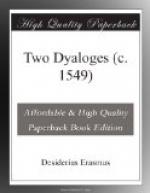A declaracion of the names.
Beatus, is he whiche hathe
abun
dance of al thinges that is good,
and is parfyte in all thynges commen-
dable or prayseworthy or to be desyred
of a good man. Somtyme it is ta-
ken for fortunate, ryche, or
noble. Bonifacius, fayre,
full of fauor or well
fauored.
[+]
* * * * *
[C]The parsons names are Beatus and Bonifacius.
Beatus. God saue you mayster Boniface. Bonifacius. God saue you & god saue you agayne getle Beatus. But I wold god bothe we were such, and so in very dede as we be called by name, that is to say thou riche & I fayre. Beatus. Why do you thynke it nothynge worth at al to haue a goodly glorious name. Bonifacius. Truely me thynke it is of no valure or lytle good worthe, onles a man haue the thynge itselfe whiche is sygnified by the name. Beatus. Yea you maye well thynke your pleasure, but I am assured that the most part of all mortall men be of another mynde. Bonifa. It may wel be I do not denye that they are mortal, but suerly I do not byleue that they are me, which are so beastly mynded. Bea. Yes good syr and they be men to laye ||your lyfe, onlesse ye thynke camels and asses do walke about vnder the fygure and forme of men. Boni. Mary I can soner beleue that then that they be men whiche esteme and passe more vpon the name, then the thynge. Bea. I graunte in certayne kyndes of thinges moost men had rather haue the thynge then the name, but in many thynges it is otherwyse and cleane cotrary. Bo. I can not well tell what ye meane by that. Bea. And yet the example of this matter is apparant or sufficiently declared in vs two. Thou arte called Bonifacius and thou hast in dede the thynge wherby thou bearest thy name. Yet if there were no other remedy but eyther thou must lacke the one or the other, whether had you rather haue a fowle and deformed face or elles for Boniface be called Maleface or horner? Boni. Beleue me I had rather be called fowle Thersites then haue a monstrous or a deformyed face, whether I haue a good face or no ||I can not tell. Bea. And euen so had I for yf I were ryche and there were no remedy but that I must eyther forgoo my rychesse, or my name I had rather be called Irus whiche was a poore beggers name then lacke my ryches. Boni. I agree to you for asmoch as ye speake the trouth, and as you thynke. Bea. Iudge all them to be of the same mynde that I am of whiche are indued with helthe or other commodities and qualities appartaynynge to the body. Boni. That is very trewe. Bea. Yea but I praye the cosyder and marke howe many men we se whiche had rather haue the name of a lerned and a holy man, then to be well lerned, vertuous, & holy in dede. Boni. I knowe a good sorte of suche men for my part. Bea. Tell me thy fatasie I pray the do not suche men passe more vpon the name then




